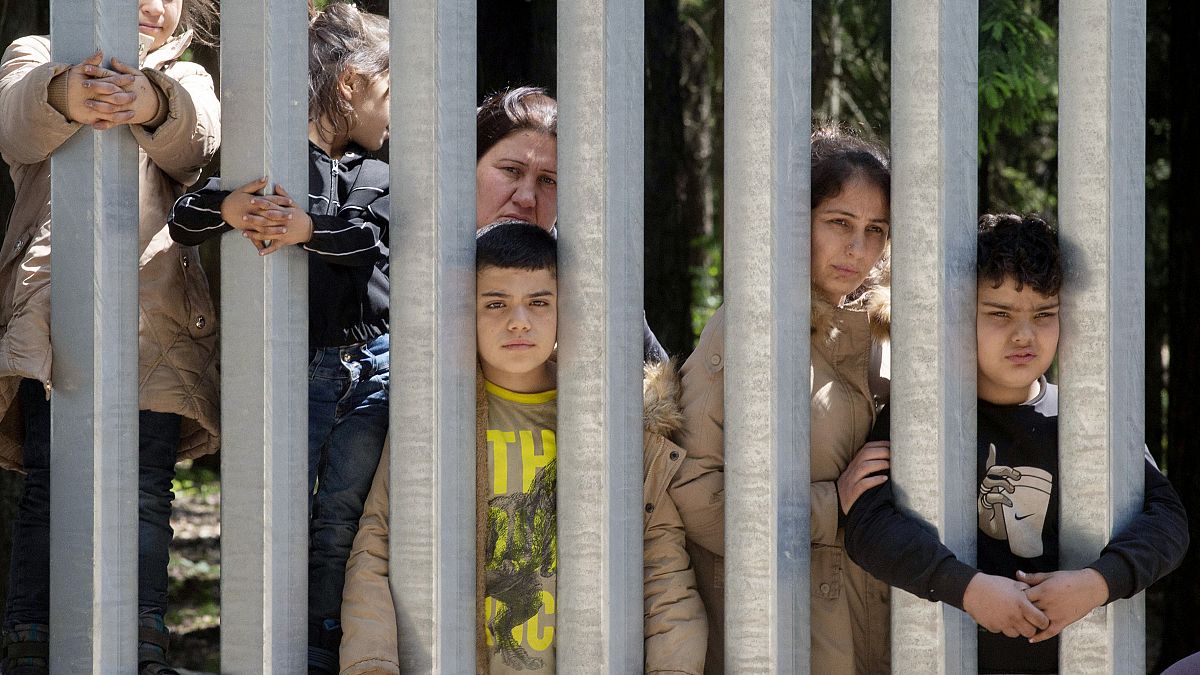“It was one of the biggest strikes of this kind, if not the biggest strike in detention centres in Poland,” attorney-at-law Zuzanna Kaciupska told Euronews.
Migrants at detention centre in Przemysl, southeast Poland, endured a days-long hunger strike to end what they called their arbitrary detention.
The strike, which began on 5 September and was reportedly over on 9 September, involved up to 70 people among the a total of 100 detainees in Przemysl.
According to Grupa Granica, a organisation assisting migrants in Poland, the strike was “the biggest protest so far in Polish detention centres.”
The group, who was in touch with some of the detainees, reported on Facebook that on 6 September, the day after the strike began, only “three of all the inmates” attended breakfast.
On the same day, the migrants presented their demand, which included “respect for their rights and dignity and to stop the use of mental and physical violence against them," said Grupa Granica.
These included access to medical and mental health care, as well as the ability to contact their loved ones through social media.
One resident tried to kill himself at the end of July, says the organisation.
‘They feel lost’
Detainees in Przemysl describe long stays without knowing when they’ll be freed or deported.
Under EU law, migrants can be detained for up to 6 months, with the possibility of extending this up to 18 months in exceptional cases.
The detention centre in Przemysl used to be for all migrants, including women and children, but was turned into a men-only facility during the COVID pandemic, says the EU Agency for Asylum.
According to Grupa Granica, some of the hunger strikers said they would refuse liquids as well as food — an extreme measure that can prove fatal much more quickly than not eating.
Euronews contacted the department of the Polish Border Guard managing the Przemysl centre for comment on Monday, but has not yet received a response.
The department previously confirmed to Balkan Insight that “several dozen residents” were on strike.
The political action by migrant detainees is unprecedented, according to Grupa Granica.
“Let us remind you. This is the first such a common hunger strike in detention centres for Foreigners,” they wrote on social media. “It has never happened that almost all the detained people joined the protest.”
In Poland, migrants can be detained while they wait for their asylum requests to be processed. They may also be waiting for deportation if ordered so by the state.
“These detention centres look quite similar to prisons. It’s a form of deprivation of liberty of the person,” an attorney-at-law at the Association for Legal Intervention Zuzanna Kaciupska told Euronews.
“People we meet in detention centres complain about the procedure surrounding their asylum requests, they often don’t understand their legal situation. For instance, they cannot communicate with border guards because they very often don’t even speak English. So they feel lost. They don’t know how long they’ll be kept in detention, or what the procedures are.”
Migrants also complain that Polish authorities are not considering their personal situation when deciding to detain them.
“Polish law says that migrants who are victims of violence should not be placed in detention centres, but very often the court or the border guards don't check that,” Kaciupska said.
“Very often we meet in detention centres people who tell us about violence they experienced in their home countries or at the border.”
A sudden end to the strike
The Przemysl strike abruptly ended on 9 September, as confirmed to Euronews by the Association for Legal Intervention and Grupa Granica.
According to the latter group, protesters were “intimidated” and felt “threatened.”
News the strike was over followed two reported stabbings in the Przemysl detention centre as officers were trying to remove protesters against their will.
A report by authorities mentioned by Grupa Granica claimed protesters were throwing chairs at officers, while they alleged that they only did so after being attacked by officers with batons.
The group said one of the protesters was taken to the hospital and others were taken into custody, as reported by the migrants themselves.
Smaller-scale hunger strikes reportedly continue in Krosno Odrzański, where two people are striking, and Kętrzyn, where one person has refused food since mid-August.
According to Grupa Granica, in the first half of 2023, only a total of 1,008 migrants were referred to Poland’s detention centres, including 56 minors.
